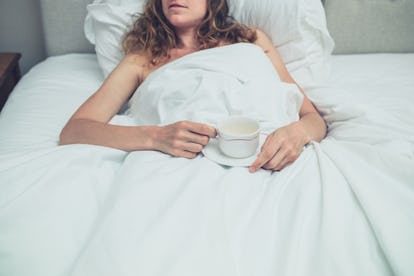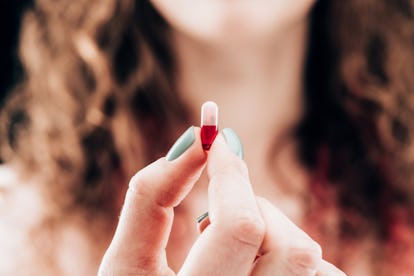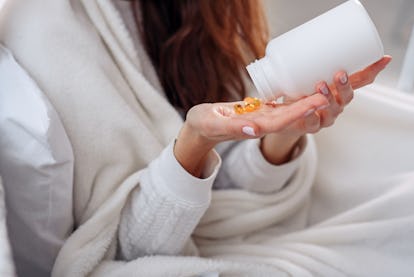8 Reasons That Your Yeast Infection Isn’t Going Away
There comes a time in every person with a vagina's life where they have to go through the wonders of a yeast infection: a condition that can make your vagina and vulva itchy and cause thick, white, vaginal discharge. Yeast infections are caused by an over-abundance of a yeast called candida albicans that lives in your vagina, according to the Mayo Clinic, and it's important to deal with it promptly so that your yeast infection goes away.
"The vagina is normally acidic," Dr. Sherry Ross, MD, an OB/GYN at Santa Monica Women's Health, tells Bustle. "This is the preferred pH balance, and is perfect for the many protective organisms which all live happily together in the vagina." When it becomes unbalanced, yeast can grow too enthusiastically, causing the symptoms of an infection. If your yeast infection tends to linger beyond the point where it should be cleared up, though, experts tell Bustle that various issues may be impeding your recovery.
Yeast infections can occur for many reasons. One, Dr. Ross tells Bustle, is underlying health issues. "Chronic medical conditions such as diabetes and other medical problems that make your immune system susceptible to infection can cause recurrent yeast infections," she says. If you have an immune system condition, you may find that your yeast infections return rapidly and are difficult to treat. If there's no distinct medical reason for your yeast infections to last as long as they do, however, the answer may lie in habits that may be unconsciously making the problem worse. Here are eight potential habits that might make your yeast infection stick around.
1. Using Irritants
Many things can disrupt the pH balance of the vagina or generally disturb its health. "The vagina can be delicate and temperamental, often affected by everyday routines including diet, medications, stress, fragranced body and laundry soaps, douching and sex, especially if you haven’t had adequate foreplay," Dr. Ross tells Bustle. Often, yeast infections can be caused by irritants in your environment that are disrupting vaginal pH balance, and if you continue to use them, you'll risk making infections worse.
There are many common irritants that you may not realize can cause a yeast infection, Dr. Ross says, including fragrant soaps, bubble bath liquids, bath salts, body washes, talcum powder, detergents, fabric softeners, sanitary wipes and pads, scented lubricants, diaphragms, condoms, spermicides, tampons, deodorant pads or creams applied to the vulva. If your yeast infection isn't clearing up, it's worth going through what you use daily and switching it for something else — or discontinuing it for a while — to see if that might help.
2. Wearing Damp Or Tight-Fitting Clothes
We've all heard this advice, but when a yeast infection is on the mend it can be easy to forget it. "If you have a yeast infection, avoid tight fitting or damp clothes or underwear," Rachel Stone, MSN MPH, Pill Club’s Director of Triage, tells Bustle. "Yeast loves damp dark environments, so wearing loose clothing and underwear (no thongs) during a yeast infection can help it go away more quickly." She also notes that it's important to change quickly after gym time or a swim to make sure that yeast doesn't linger in the damp clothing.3
Not Completing Your Yeast Infection Medication
It can be tempting to stop taking your yeast medication once you're pretty sure it's all cleared up, but according to Dr. Ross, this may mean the infection sticks around. "Many women don’t complete the course of treatment for yeast," she tells Bustle. "Whether you are taking Diflucan, which is a 2-pill treatment regime, or over-the-counter remedies, you need to take the entire treatment recommendation."
4. Excess Sugar In Your Diet
Diet can have ongoing effects on your yeast infection, and you may need to stay away from sugar while you're recovering from one. "Sugar can often be a major culprit in a yeast infection lingering and recurring," Stone tells Bustle. "Too much sugar in your diet increases your blood sugar. This can disrupt the pH balance in your vagina and lead to yeast infections."
5. Too Much Caffeine & Alcohol
Not only is sugar a problem, other dietary elements can cause yeast infections to linger too. "Caffeine and alcohol can affect the delicate pH balance of the vagina, leading to recurrent infections," Dr. Ross tells Bustle. When you're recovering, it's sensible to keep intake of both to a minimum, experts say.
6. Using Douches Or Vaginal Wipes
Douches are not necessary and neither are vaginal deodorants — and they can make yeast infections worse, experts say. "Your vagina is a self-cleaning oven," Stone tells Bustle. "There is necessary bacteria that you need to maintain a healthy pH, and douching, vaginal wipes, and sprays can throw off your vagina’s pH by removing the bacteria you need." If you do want to use any intimate products while you have a yeast infection, she recommends trying to find ones that are completely fragrance-free.
7. Taking Antibiotics Frequently
You may not realize that taking antibiotics for an unrelated issue can impact your yeast infection, but the two can be connected. "Chronic antibiotic use can lead to recurrent yeast infections," Dr. Ross explains. "As an example, if you are taking antibiotics for acne, this can lead to chronic yeast infections." Antibiotics can alter the population of organisms in your vagina and cause yeast to grow. If you're taking antibiotics and are prone to yeast infections, it's worth discussing good preventative measures with your doctor to make sure you can manage both situations at the same time.
8. Not Having A Swab Test
If your yeast infection has been sticking around for a long time and won't go away despite recurrent treatment, it may be something else entirely, experts say. "There are many infections of the vagina that mimic a yeast infection," Dr. Ross tells Bustle. "They include sexually transmitted infections such as chlamydia and trichomoniasis, a bacterial infection, a skin allergy to latex or feminine hygiene products, a lack of estrogen as seen in menopause or breastfeeding, or tears in the vagina." You may also have a resistance to the common medication for yeast infections. Either way, it's best to go to get a vaginal swab to see what's really going on.
9.
Recurrent yeast infections can be a really difficult problem, but changing some of these habits may provide some relief. Stone also recommends a dietary shift. "If you have a yeast infection, taking daily probiotics can help your pH balance and lessen the length of your yeast infections," she says. "Most health food stores will even have probiotics specifically meant for vaginal health." Recurrent yeast infections may also be a sign of something more serious, so it's always worth being checked out for an underlying problem.

